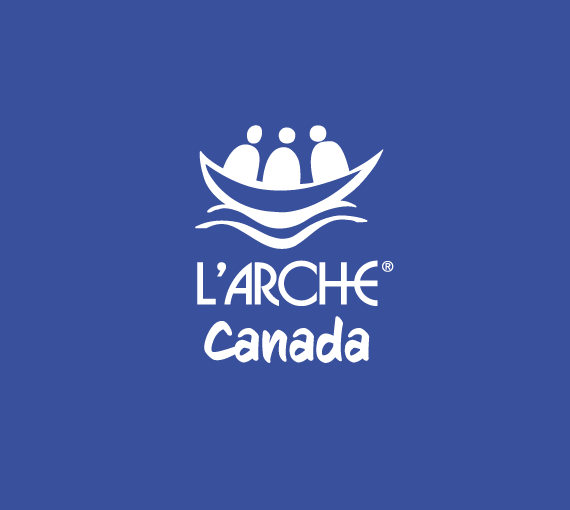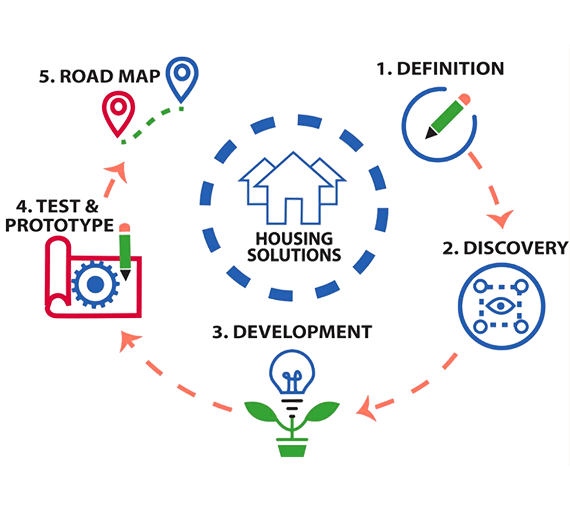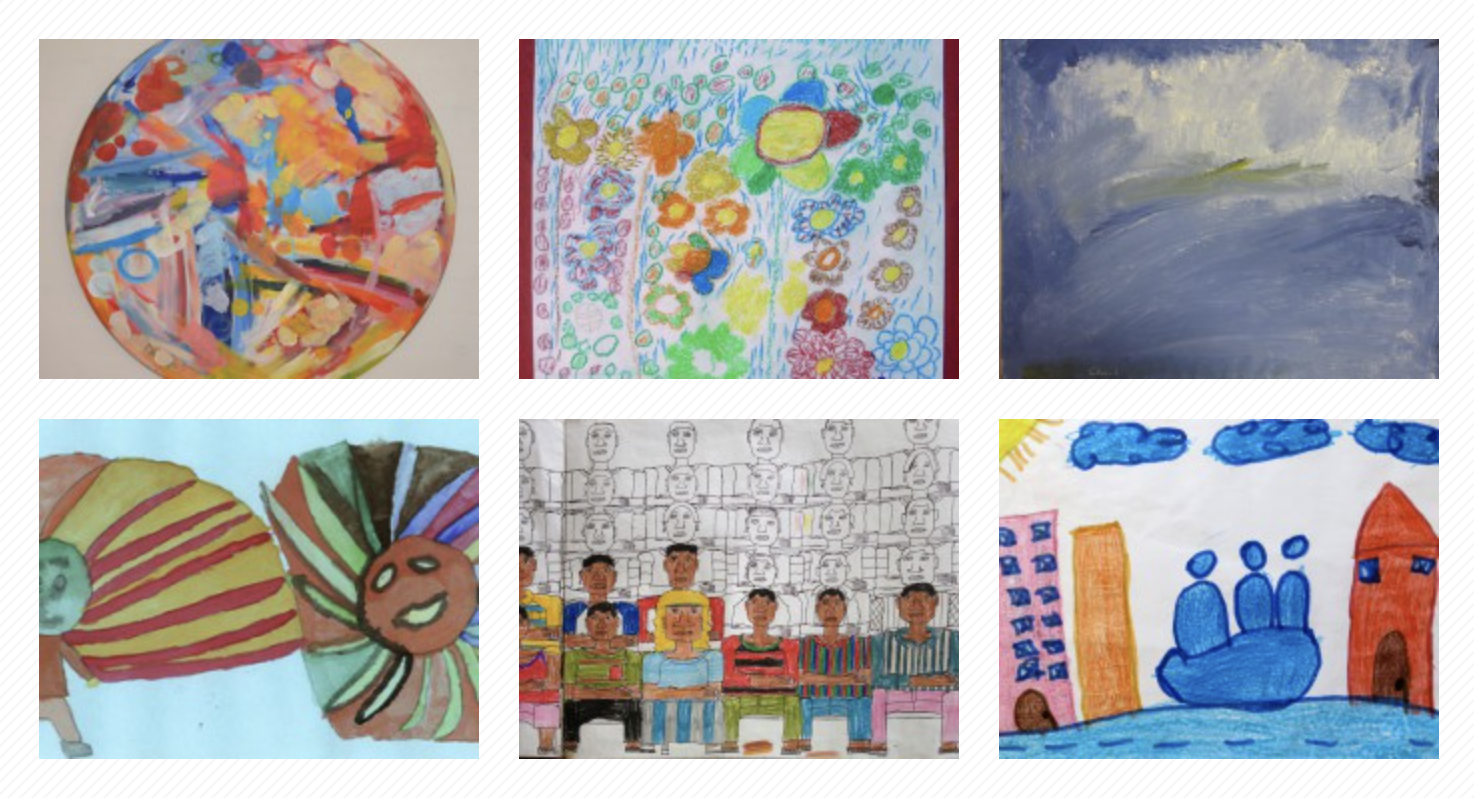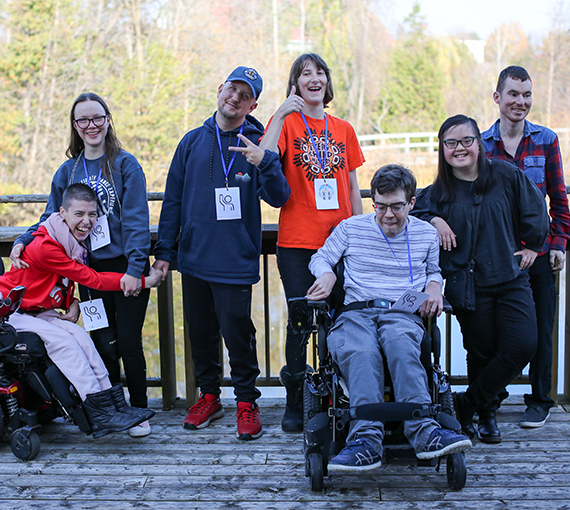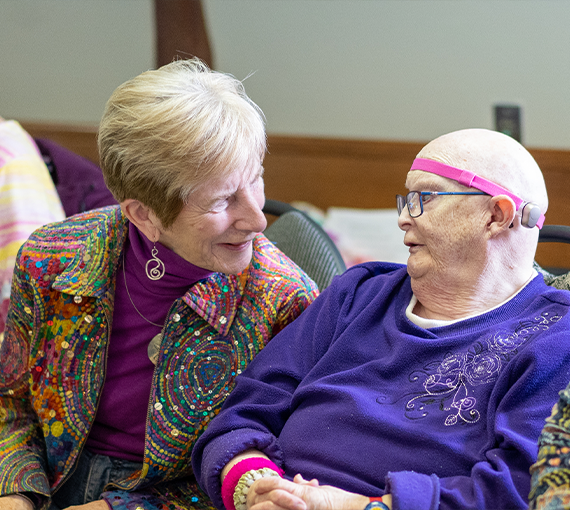L’Arche in Canada, the 30 L’Arche communities in 9 provinces as well as the regional and national organization, is committed to promoting the contributions of persons with intellectual disabilities and partnering with others to build a more diverse and inclusive society. This paper develops directions presented in the L’Arche Canada Submission to Consulting with Canadians on Accessibility Legislation, February 25, 2017.
A Vision of a Diverse and Inclusive Canada
In a divided world, Canada is a beacon of hope. Prime Minister Justin Trudeau stated, “Our commitment to diversity and inclusion… is a powerful and ambitious approach to making Canada, and the world, a better, and safer, place.”
The vision of L’Arche is rooted in these values. We dream of a world where:
- People with intellectual and other disabilities participate fully in society – living, learning, working, and contributing to the communities where they belong;
- Relationships between people who are different in background, experience and ability are rooted in mutual respect, care, and learning (reciprocity);
- Vulnerability and imperfection are embraced as essential parts of what it means to be human and the pathway to interdependence;
- Communities are places of belonging that welcome the contribution of each person and recognize that we need each person’s contribution’s in order to thrive; and
- Diversity and inclusion are celebrated as the rich yet challenging source of the creativity and innovation, empathy and cooperation, joy and unity that make a better, safer world.
Barriers to inclusion
While we pride ourselves on our commitment to inclusion and diversity, Canadian society has a long way to go to make this vision a reality for persons with intellectual and other disabilities. And that’s a problem not only for these individuals and their families, but also for our country. We aren’t benefiting from the gifts of these citizens – gifts needed to address some of our greatest challenges about how we live together with respect for our differences, with our vulnerabilities as well as our strengths, and with greater connection, compassion, and commitment to the common good.
People with intellectual disabilities often live like strangers among us, segregated by inadequate and specialized services, lacking opportunities for relationships, belonging, and to contribute their gifts and abilities. Many of the approximately 750,000 Canadians with intellectual disabilities lack the safety and supports they need to reach their full potential. Too often, aging parents remain primary caregivers with no idea who will be there for their adult children when they are gone.
The solutions of the past such as group homes and day programs, while still needed to support persons with more complex care needs, are costly and cannot meet growing demand for the person-centred supports that increase choice, capacities, community inclusion, and interdependence. These innovative, more sustainable supports prioritize strong social networks and community-based opportunities, yet they are far from a reality for most people.
Complex factors contribute to the slow pace of service systems transformation:
- The number of people with significant support needs is increasing dramatically;
- The DS sector is overwhelmed and slow to implement innovative solutions;
- Focus on independence rather than interdependence is leaving many people lonely and more vulnerable;
- Governments facing rising costs in more visible sectors such as health, elder care, and education have little left to invest in developmental services; and
- Community capacity to provide supports that welcome the gifts of people with intellectual disabilities is limited at best.
Policy that supports systems transformation
While we have taken many steps towards inclusion in Canada, we have a long way to go. We cannot get there by policies and programs alone – we need ongoing transformation of the hearts and minds of individuals and communities – yet we need policies and programs that support this transformation.
L’Arche Canada supports federal legislation that will help Canada meet our commitment to the United Nations Convention on the Rights of Persons with Disabilities (CRPD) and be the standard for the provinces, territories and municipalities in their jurisdictions. This legislation will guarantee a sustained commitment and strategic investments in areas where the federal government has jurisdiction that promotes the inclusion of persons with disabilities in the full life of their communities.
Inclusion as catalyst for change
The Inclusion movement recognizes that relationships, belonging, and the opportunity for each person to contribute their gifts and abilities are essential to the health and wellbeing of both individuals and their communities. It envisions a world where each person regardless of ability, age, or background has the opportunity and support to be a full, contributing member of society.
Inclusion means change. It’s about building a new social framework that supports the valued contribution of all members of society including people who don’t “fit in” a society that values competition, independence, and the individual over interdependence and community. We need to facilitate listening to individuals who do not yet have a voice due to their life experience, communications challenges, and lack of adequate supports.
When communities welcome the contributions of persons with intellectual and other disabilities, they thrive, and we all benefit from a more vibrant, creative, and compassionate society. When people with intellectual disabilities take their rightful place at the table, they change the table!
Components of a Culture and Practice of Inclusion
a) Listen to the experience, dreams and goals of persons with disabilities:
- Focusing on their gifts and abilities
- Recognizing that this is a diverse community with a broad spectrum of abilities, life experience, personalities, interests, faith and cultural backgrounds, social networks, education, and support needs
- Respecting that individuals have varying histories of oppression and exclusion including high levels of abuse
- Knowing that many individuals use alternative forms of communication
b) Develop strong social networks for persons with intellectual disabilities:
- That keep the voice of the individual at the centre
- Building with family, friends, co-workers, and members of their communities of interest whom they choose to include
- Based on reciprocity and learning together
- That increase belonging in their communities of choice
c) Provide accessible opportunities for education, training, employment, volunteering, and other valued ways of belonging and contributing in community:
- Tailored to the unique strengths and challenges of the individual
- Optimizing inclusion and social connection, choice, dignity and autonomy while recognizing the need for safety and value of interdependence
- Seeking creative ways to increase employment and develop a continuum of alternative options for meaningful contribution
d) Educate all Canadians in the values and practices of diversity and inclusion:
- Reflecting on culture -what it means to belong and the challenges as well as the gifts of living with difference;
- Rooted in cultural sensitivity to a unique yet diverse community;
- Recognizing a history of oppression and exclusion stemming from “ableism” and other societal barriers;
- Including positive stories of individual accomplishment and the impact of inclusive on communities.
e) Develop community capacity for inclusion and belonging:
- Beginning with assessment of community assets and challenges
- Geared to inclusion in existing community supports and spaces
- Creating long-term, strategic development goals
- Including leadership development at all levels
f) Support Disability Arts as a means of raising public awareness of the gifts and contributions of artists with intellectual and other disabilities:
Call to Action
The Mission of L’Arche calls us to:
- Announce the gifts and contributions of persons with intellectual disabilities and the transformational power of mutual relationships and life-sharing in and with community;
- Develop supports that develop capacities and respond to the expectations and needs of persons with intellectual disabilities, are rooted in our core values, and promote inclusion; and
- Engage with others in Canada who are working to create a more human (diverse, and inclusive) society, a world where everyone belongs.
L’Arche in Canada has been making this vision, first articulated by Jean Vanier, a reality for 50 years. With the depth of our experience and expertise, and national reach extending beyond the developmental services sector, L’Arche is poised to take a lead in transforming the way Canadians see people with intellectual disabilities and welcome their gifts and contributions.
Through our Growth Initiative, we are transforming the way we support persons with disabilities in our 30 L’Arche communities across Canada. Our traditional L’Arche homes, which remain a vital expression of the unique L’Arche relational model, will also be renewed through increased engagement with inclusion practices such as person-centred planning, circles of support, and meaningful belonging in the wider community at each stage of a person’s life.
A wide range of innovative housing, vocational, and community inclusion supports are reinvigorating the L’Arche relational model while making it more flexible, sustainable, and accessible. Community Inclusion Hub approaches will link persons with disabilities and their supports with partners in the broader community. A spectrum of supports will respond to changing hopes and needs of members over their lives. This transformation will allow L’Arche in Canada to open our doors to welcome many more Canadians (with and without intellectual disabilities) to share life in L’Arche in dynamic new ways.
L’Arche in Canada will develop more partnerships engaging deeply in public dialogue to promote diversity and inclusion, share knowledge, and transform service systems. With our donors and government funders, we will develop capacity to scale our innovations and measure our impact. Together, we will increase broader-community capacity to welcome persons with intellectual disabilities and their contributions.
Because L’Arche is an international organization with over 150 communities in 37 countries, we have global impact in promoting the values of inclusion and diversity. L’Arche Canada is working to significantly increase support for L’Arche in the developing world (where there is little government funding) in solidarity with our brothers and sisters who have so much to give and teach us.
With the support of our donors, government funders, and other partners, L’Arche will continue to transform the lives of our members, families, friends, and neighbours in our towns and cities across Canada and around the world. Together, we will reignite the vision first discovered by Jean Vanier and his companions in 1964, increasing the impact of L’Arche for a new generation.
L’Arche is fully engaging the Community Inclusion movement working with others committed to creating more vibrant communities, a more just and diverse society, and a world where everyone belongs.


